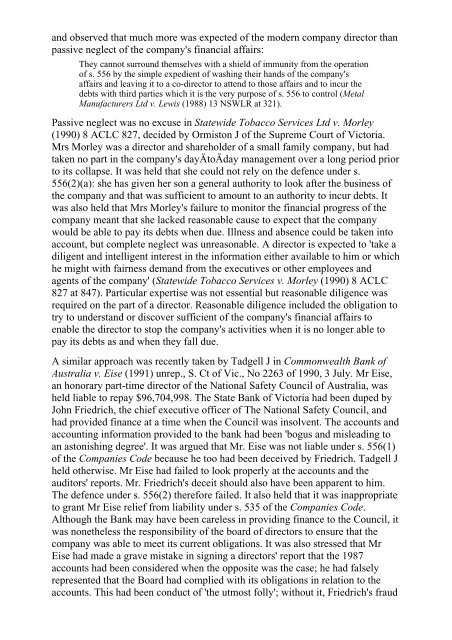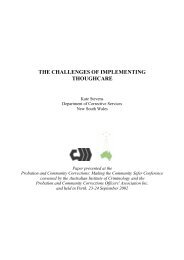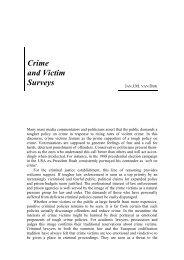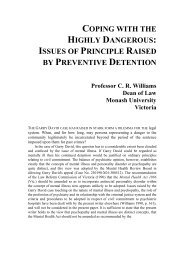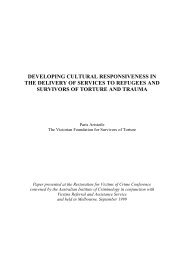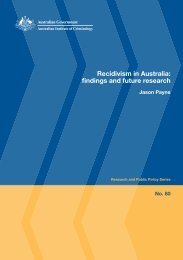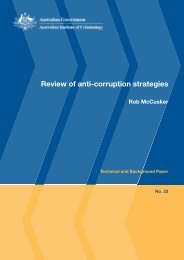Fraud and the liability of company directors - Australian Institute of ...
Fraud and the liability of company directors - Australian Institute of ...
Fraud and the liability of company directors - Australian Institute of ...
You also want an ePaper? Increase the reach of your titles
YUMPU automatically turns print PDFs into web optimized ePapers that Google loves.
<strong>and</strong> observed that much more was expected <strong>of</strong> <strong>the</strong> modern <strong>company</strong> director than<br />
passive neglect <strong>of</strong> <strong>the</strong> <strong>company</strong>'s financial affairs:<br />
They cannot surround <strong>the</strong>mselves with a shield <strong>of</strong> immunity from <strong>the</strong> operation<br />
<strong>of</strong> s. 556 by <strong>the</strong> simple expedient <strong>of</strong> washing <strong>the</strong>ir h<strong>and</strong>s <strong>of</strong> <strong>the</strong> <strong>company</strong>'s<br />
affairs <strong>and</strong> leaving it to a co-director to attend to those affairs <strong>and</strong> to incur <strong>the</strong><br />
debts with third parties which it is <strong>the</strong> very purpose <strong>of</strong> s. 556 to control (Metal<br />
Manufacturers Ltd v. Lewis (1988) 13 NSWLR at 321).<br />
Passive neglect was no excuse in Statewide Tobacco Services Ltd v. Morley<br />
(1990) 8 ACLC 827, decided by Ormiston J <strong>of</strong> <strong>the</strong> Supreme Court <strong>of</strong> Victoria.<br />
Mrs Morley was a director <strong>and</strong> shareholder <strong>of</strong> a small family <strong>company</strong>, but had<br />
taken no part in <strong>the</strong> <strong>company</strong>'s dayÄtoÄday management over a long period prior<br />
to its collapse. It was held that she could not rely on <strong>the</strong> defence under s.<br />
556(2)(a): she has given her son a general authority to look after <strong>the</strong> business <strong>of</strong><br />
<strong>the</strong> <strong>company</strong> <strong>and</strong> that was sufficient to amount to an authority to incur debts. It<br />
was also held that Mrs Morley's failure to monitor <strong>the</strong> financial progress <strong>of</strong> <strong>the</strong><br />
<strong>company</strong> meant that she lacked reasonable cause to expect that <strong>the</strong> <strong>company</strong><br />
would be able to pay its debts when due. Illness <strong>and</strong> absence could be taken into<br />
account, but complete neglect was unreasonable. A director is expected to 'take a<br />
diligent <strong>and</strong> intelligent interest in <strong>the</strong> information ei<strong>the</strong>r available to him or which<br />
he might with fairness dem<strong>and</strong> from <strong>the</strong> executives or o<strong>the</strong>r employees <strong>and</strong><br />
agents <strong>of</strong> <strong>the</strong> <strong>company</strong>' (Statewide Tobacco Services v. Morley (1990) 8 ACLC<br />
827 at 847). Particular expertise was not essential but reasonable diligence was<br />
required on <strong>the</strong> part <strong>of</strong> a director. Reasonable diligence included <strong>the</strong> obligation to<br />
try to underst<strong>and</strong> or discover sufficient <strong>of</strong> <strong>the</strong> <strong>company</strong>'s financial affairs to<br />
enable <strong>the</strong> director to stop <strong>the</strong> <strong>company</strong>'s activities when it is no longer able to<br />
pay its debts as <strong>and</strong> when <strong>the</strong>y fall due.<br />
A similar approach was recently taken by Tadgell J in Commonwealth Bank <strong>of</strong><br />
Australia v. Eise (1991) unrep., S. Ct <strong>of</strong> Vic., No 2263 <strong>of</strong> 1990, 3 July. Mr Eise,<br />
an honorary part-time director <strong>of</strong> <strong>the</strong> National Safety Council <strong>of</strong> Australia, was<br />
held liable to repay $96,704,998. The State Bank <strong>of</strong> Victoria had been duped by<br />
John Friedrich, <strong>the</strong> chief executive <strong>of</strong>ficer <strong>of</strong> The National Safety Council, <strong>and</strong><br />
had provided finance at a time when <strong>the</strong> Council was insolvent. The accounts <strong>and</strong><br />
accounting information provided to <strong>the</strong> bank had been 'bogus <strong>and</strong> misleading to<br />
an astonishing degree'. It was argued that Mr. Eise was not liable under s. 556(1)<br />
<strong>of</strong> <strong>the</strong> Companies Code because he too had been deceived by Friedrich. Tadgell J<br />
held o<strong>the</strong>rwise. Mr Eise had failed to look properly at <strong>the</strong> accounts <strong>and</strong> <strong>the</strong><br />
auditors' reports. Mr. Friedrich's deceit should also have been apparent to him.<br />
The defence under s. 556(2) <strong>the</strong>refore failed. It also held that it was inappropriate<br />
to grant Mr Eise relief from <strong>liability</strong> under s. 535 <strong>of</strong> <strong>the</strong> Companies Code.<br />
Although <strong>the</strong> Bank may have been careless in providing finance to <strong>the</strong> Council, it<br />
was none<strong>the</strong>less <strong>the</strong> responsibility <strong>of</strong> <strong>the</strong> board <strong>of</strong> <strong>directors</strong> to ensure that <strong>the</strong><br />
<strong>company</strong> was able to meet its current obligations. It was also stressed that Mr<br />
Eise had made a grave mistake in signing a <strong>directors</strong>' report that <strong>the</strong> 1987<br />
accounts had been considered when <strong>the</strong> opposite was <strong>the</strong> case; he had falsely<br />
represented that <strong>the</strong> Board had complied with its obligations in relation to <strong>the</strong><br />
accounts. This had been conduct <strong>of</strong> '<strong>the</strong> utmost folly'; without it, Friedrich's fraud


